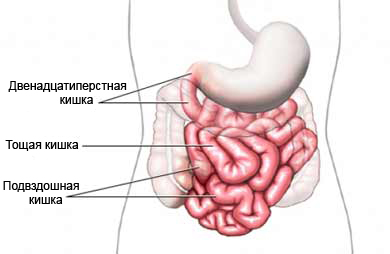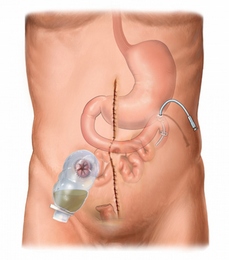Enterectomy – Operation at ileum
Description of the small bowel resection
Resection of the small intestine is to remove part of the small intestine. The small intestine comprises the duodenum, jejunum and ileum. The operation can be done through the open incision or through laparoscopic technique.

Causes of small bowel resection
This procedure can be done to treat the following diseases:
- Bleeding, infection, or ulcer in small intestine;
- Cancer;
- Precancerous polyps;
- Crohn's Disease;
- Intestinal blockage;
- Damage.
Possible complications of small bowel resection
Complications are rare, but no procedure does not guarantee the absence of risk. Before, how to perform a resection of the small intestine, you need to know about possible complications, which may include:
- Excessive bleeding;
- Infection;
- Obstruction of the bowel scar tissue;
- Hernia on the site of the incision.
Factors, that may increase the risk of complications:
- Smoking;
- Previous abdominal surgery.
How is a small bowel resection?
Preparation for the procedure
Your doctor may prescribe the following procedures:
- Medical checkup;
- Blood and urine tests;
- Chest X-ray;
- X-ray life;
- Computed tomography of the abdomen.
In the run-up procedure:
- Consult your doctor about the drugs taken. A week before surgery you may be asked to stop taking some medicines:
- Aspirin or other anti-inflammatory drugs;
- Blood thinners, such as clopidogrel (Plaviks) or warfarin;
- We need to take medicines as recommended by your doctor. The most frequently prescribed antibiotics;
- The intestine must be cleared before the operation. During the week before the operation you need to eat foods that are high in fiber and drink 6-8 glasses of water a day. This will encourage defecation. It can be recommended to other cleaning methods, including enemas, laxatives, as well as the transition to a liquid diet. You may be asked to drink a large container of a special solution, that will completely empty the bowel;
- Eat lean food, in accordance with the instructions of the doctor.
Anesthesia
At step used general anesthesia, which blocks the pain and the patient support in sleep.
Procedure resection of the small intestine
This procedure can be done in one of two ways:
- Traditional open incision – in the abdomen in the patient intestines will make the cut, through which the operation is conducted;
- Laparoscopic equipment – in the abdominal area will be made by several small incisions. Through one of the incisions into the peritoneal cavity will be pumped into the carbon dioxide. Laparoscope (a thin tube with a small camera on the end), and special surgical instruments are inserted through other sections. The laparoscope transmits images of the internal organs of the abdominal cavity on the screen.
In both types of operation, small intestine will be clamped above and below the patient area. Thereafter, the pathological portion of the small intestine is cut and removed from the abdominal cavity.
If remains quite healthy bowel, its free ends are joined together. Otherwise, a permanent or temporary Ileostomy. Ileostomy – opening (so-called stoma) abdominal. The end of the small intestine, closest to the stomach is attached to the hole. This allows intestinal contents to go in a sealed bag, which is attached to the outer side of the body. If it is a temporary ileostomy, a few months later, will be needed another operation, to sew the two parts of the small intestine. Abdominal incision will be closed with stitches.

How long will the resection of the small intestine?
About 1-4 hours.
Enterectomy – Will it hurt?
Anesthesia prevents pain during the procedure. To reduce pain during recovery provides pain medicine doctor.
The average hospital stay
Typically, the length of stay at the hospital is 5-7 days. Your doctor can extend the period of stay, If there are complications.
Care after resection of the small intestine
Care in a hospital
Before surgery, your bladder catheter will be placed. Also, a patient is set nasogastric – small tube, which is inserted through the nose and goes down, the stomach. The tube may be used to drain fluid from the stomach or feeding. The catheter and the probe will remain, while you will not be able to eat normally and go to the toilet.
Home Care
When you return home, Follow these steps:, to ensure the normal recovery:
- Your doctor will tell you, when you are able to resume daily activities;
- Consult with your doctor about performing heavy and tedious work;
- Do not drive, if the doctor has not given you permission to do so;
- Ask the doctor, when it is safe to shower, bathe, or to expose the surgical site to water;
- Do exercises for the legs, when you are in bed, to prevent blood clots;
- If you go home with iliostoma, will be given instructions on how, how to change the package to the collection of waste and maintain personal hygiene;
- Be sure to follow your doctor's instructions.
Contact your doctor after resection of the small intestine
After discharge from the hospital need to see a doctor, If the following symptoms:
- Signs of infection, including fever and chills;
- Redness, edema, bleeding or discharge from the incision;
- Stitches or staples odds;
- Nausea and / or vomiting, which do not disappear after taking the prescribed medicines, and persist for more than two days after discharge from the hospital;
- Persistent abdominal pain and bloating;
- Constipation or diarrhea;
- Rectal bleeding or tarry stools color;
- Pain, which does not pass after taking pain medication appointed;
- Cough, shortness of breath or chest pain;
- Pain, burning, frequent urination or persistent blood in the urine;
- Other painful symptoms.
